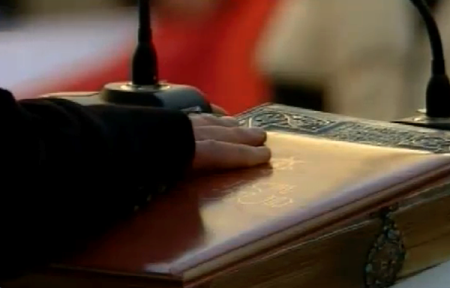The new edition of the constitution comes into force

The President of Georgia Giorgi Margvelashvili will have rather reduced authorities than his predecessor upon amendments to the constitution.
He will not be allowed to hold additional posts outside the presidency, convene an emergency session of Parliament, initiate daft laws, and suspend acts issued by the government.
The titles of Head of State and Commander-in-Chief remain as the authority of Margvelashvili. He will also represent Georgia in foreign affairs, grant award special ranks, grant citizenship, pardon prisoners, and sign laws.
The presidents authority of appointing or dismissing members of the government will be shifted to the Prime Minister. Also, if the president wants to declare war or state of emergency, call elections, ratify international agreements or constitutional agreements with the orthodox church, he will need the signature of the Prime Minister.
Besides this, the presidents authorities like directing and executing the countrys foreign and domestic policy, submitting state budget to Parliament for consideration, requesting parliament to ratify or annul international treaties, appointing or dismissing provincial governments or calling for a referendum will be shifted in power of the government.
The new president will need the governments agreement to appoint or dismiss the chief of staff for the armed forces and other top military commanders, nominate the head of the government of the Autonomous Republic of Adjara and appoint or dismiss ambassadors and diplomats.
Also, since the President of Georgia, Giorgi Margvelashvili took the oath earlier today, these things will be changed in terms of state governance:
- Constitutional provision adopted by the end of 2010 comes into force according to which the government will be obliged to hold a referendum in order to introduce new tax (except excise tax) or increase the rate of existing one.
- Constitutional provision of appointing judges for life also comes into force with the oath of the President. According to the constitutional amendments in 2010, a judge will be appointed for lifetime before reaching the statutory age. In addition to this, age threshold for judges increases from 28 to 30 years. Thismeans that a judge must be a citizen of 30 years of age in case he or she has relevant higher education and at least five years of experience.
- From the moment of taking an oath by Margvelashvili, the parliament will find it difficult to distrust the government as far as the relevant procedures will be quite complicated and protracted, according to the constitutional provisions adopted in 2010. In case the parliament will decide to distrust the government, it will take at least two month to conclude the process and also, doing so, the parliament will be obliged to stuff the new government within given deadline. However, in case the parliament will distrust the government, the president will be authorized to dissolve the parliament within three days and schedule early elections.
- From now on, Georgian government will not need Presidential approval for submission of the state budget to the parliament. All the power the president had, in terms of budgetary process until present, will be removed. In particular, before the oath of the new president, in case the parliament would not approve a report on the implementation of the state budget, the president would consider the responsibility of the government and let the parliament know his decision within one month. He was also given a right by the constitution to approve the draft budget by his decree in case the parliament would file to approve it within the legal deadline.
 Tweet
Tweet  Share
Share